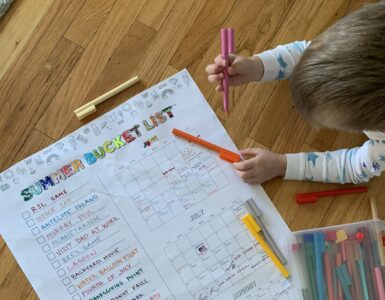Every parent wants their child to feel good about themself. Take advantage of the summer break and plan activities that help build self-esteem.
Self-Worth Analyst, Karen Eddington , says playtime is the perfect time to build your child’s self-image.
Everyday playtime settings are a vital place for parents to teach a healthy self-esteem. Parents often ask, “What can I do to help my child feel a sense of worth?” During summer break, parents can have fun while helping their children as they understand three things:
1. Every person must learn and know for themselves that they are a person of worth. No matter how hard a parent may try, they simply cannot give a child a high self-esteem. What they can do is create an environment where the child can discover their worth for themselves.
2. Helping a child is going to take consistent effort in everyday activities.
3. Parents can learn skills and techniques which can help their child. Pivotal Parenting: the technique where parents guide a child away from using any element as the source worth, and instead encourage self-acceptance while allowing the elements around us to become a supplement to life.
We all tend to base our worth on six things: appearance, achievements, opinions, addictions, intelligence, ideals. There comes a point we either let these six things become the source of our worth, or a supplement to life. If we can be aware of what they are as a Mom, we can start teaching our children to pivot in a healthy way. Here are six summer activities parents can use to teach children to build a healthy self-esteem.
1. Appearance: We often base our worth as a person on how we look.
Teaching Activity: Fashion designer for a day. Get out your newspapers, staplers, and tape and create an outfit. As you staple your princess sleeves and pirate pleats talk about the pressures we face, media images, and what beauty means to you. Have a family, neighborhood, or girl’s camp fashion show with your designs. Help your child see that we should use elements of fashion as a way to take care of ourselves. We are not worthwhile because of fashion and beauty, rather it is because we are already a person of worth, we allow fashion and beauty to enrich our life.
2. Achievements: We often let what we do define who we are. There are times we only feel valuable if we are involved in something or have been given high honors.
Teaching Activity: You rock soccer. Go to your nearest soccer field or back yard. Let each person take turns shooting a goal. When they make it, tell them a reason that they “rock” beyond the soccer field. “Tyler, you are so kind to others, you rock.” As you play, start conversations about how it is fun to have goals in life. Soccer can be a fun activity, but we don’t have to be a soccer superstar (or music, dance, football, etc) in order to fit in and be important. Find ways in everyday life to have natural conversation about achievements.
3. Opinions: We frequently base our worth on what people think and say about us.
Teaching Activity: Hero notes. Think about five traits that you admire (honesty, kindness, etc) Pick five everyday people in your life that emulate that trait and secretly write and mail these notes to your everyday heroes. From grandma to your postman, help your children learn to build other people up. Teach your children to see the good in others. As they write their notes, stop and write your own hero note to your child. Let them know that no matter what anyone says or thinks about them that you love them and support them, helping them pivot away from using the opinions of other as the source of their worth by developing self-acceptance.
4. Daily Reliance: Think about the things you look to in order to get through a day. Cell phones, e-mail, blogging, shopping, snuggle bear, blankets, chocolate, soda, etc. Many people rely on these items to derive meaning out of life.
Teaching Activity: A day without a favorite. Every member of the family picks something that they use a lot that they will put in a box for a day. For larger items you can use a chalkboard to write these items on. To make it fun let each member of the family pick a reward for doing so. Choose rewards that are new, that you have never tried before. If mom will give up her cell phone for a day, the eight year old will suggest going on a bike ride. If the eight year old will let go of a loved computer game, Mom may suggest they have “Fiesta” lunch using innovative recipes from Mexico or another country. Talk about how these items impact you, how they are good, and how they can become an addiction.
5. Intelligence: If we feel smart, if we get good grades in school, or if we can answer the
Questions of others, all can impact how important we feel.
Teaching Activity: The power hour journal. You can teach your child that knowledge and learning are important, while at the same time not using intelligence as the source of our worth. Designate a fun learning time called, “power hour.” The key will be taking away the education pressure to succeed and just explore. You can do this by using a super hero or dress-up costume associated with learning time. As the hour begins decide on one thing you want to know more about. Using the journal, document your experience. For example, at the beginning of the hour your child may want to learn about what ants eat. The hour may begin with a computer search on ants, then taking the journal outside as they draw pictures of ants writing down observations.
6. Ideals: We often use perfect life circumstances to govern if we are important.
Teaching Activity: The imperfect picnic. Give each member of the family a brown paper bag. One at a time, each person will load up their bag with a secret handful of things they think will be fun on a picnic. You may end up with a bag full of bread, a cup of yogurt with no spoon, a jar of peanut butter, and some cheese. As you get to your picnic destination let each person reveal what they brought. Instead of letting flawed moments ruin our lives, let’s let it be okay to have imperfections. Let’s learn to celebrate the un-ideal situations of life.
Karen Eddington is a Self-Worth Analyst, and has spent the last ten years in outreach and research work to learn about the self-esteem concerns of women and teens. For more information on building self-esteem in your child or for upcoming Pivotal Parenting classes you may go to www.selfworthretreat.com















Add comment